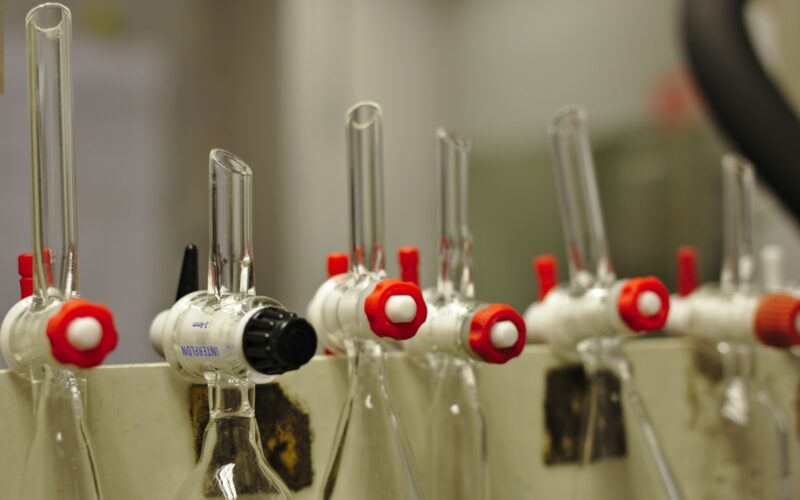Chemistry deals with the study of matter and its properties. Through chemistry, we learn about atoms, elements, and compounds that make up the Earth and the atmosphere surrounding it. It is a very important branch of science without which our understanding of the world around us is incomplete. Knowledge regarding the composition and nature of chemicals along with their subsequent uses lets us study a variety of physical and biological phenomena. Class 12 CBSE Chemistry is written in relatively simple language but is still detailed.
Chemistry is divided into 3 segments – organic, inorganic, and physical. Physical chemistry deals with macroscopic and particulate matter. It talks about the physical properties of atoms and molecules while explaining how chemical reactions work. Inorganic compounds are those that do not contain carbon atoms. Thus, inorganic chemistry deals with such elements. Metallurgy is a significant part of inorganic chemistry. Organic chemistry is the study of carbon-based compounds that form a huge chunk of the syllabus in class 12. It consists of carbonates, oxides, carbides, alkenes, alkynes, etc.
CBSE Class 12 Chemistry Syllabus
16 chapters make up the entirety of Class 12 Chemistry. These chapters are not only vital for board exams but also are extremely important for competitive exams like JEE and NEET, which are based on the NCERT syllabus.
- Unit I: Solid State – Different structural lattices are explained and an elementary idea about amorphous and crystalline solids is given. Questions asked from this part often ask you to find the radius of a unit cell or calculate the density of the given molecule.
- Unit II: Solutions – Colligative properties are taught in detail here. Raoult’s law, the solubility of gases in liquids, concentration terms, and Henry’s law are all part of Unit II.
- Unit III: Electrochemistry – This chapter is full of formulas and derivations that need to be remembered by regular practice. EMF of a cell, standard electrode potential, Nernst equation, and redox reactions are some of the topics covered. Towards the end, students are taught about fuel and electrolytic cells.
- Unit IV: Chemical Kinetics – The rate of a reaction is calculated by knowing the concentration of the products and reactants. Collision theory is a section from which short questions are asked in the exam often. An elementary idea about integrated rate equations and the half-life of a radioactive substance is also given.
- Unit V: Surface Chemistry – This chapter is one of those that has to be memorised thoroughly. It contains a lot of theoretical knowledge whose application is difficult to understand at this level. However, Surface Chemistry is an important chapter from the syllabus point of view.
- Unit VI: General Principles and Processes of Isolation of Elements – Metallurgical operations are explained in detail. These operations include concentration, oxidation, reduction, and refining. An ore is extracted and then processed.
- Unit VII: p-Block Elements – The periodic table is divided into s, p, d, and f blocks. S-block is part of the class 11 syllabus alongside groups 13 and 14 of the p-block. The rest of the p-block is dealt with elaborately here.
- Unit VIII: d and f Block Elements – This chapter gives a detailed description of transition metals, lanthanides, and actinoids and their properties are discussed. However, there are a lot of exceptions in this chapter that need to be remembered for the examination.
- Unit IX: Coordination Compounds – IUPAC nomenclature of mononuclear coordination compounds holds a lot of weightage. Werner’s theory, VBT, and CFT have to be read over and over again to be learnt properly.
- Unit X: Haloalkanes and Haloarenes – Haloalkanes and haloarenes mark the beginning of organic chemistry. The reaction mechanism has to be studied alongside the directive influence of halogen in monosubstituted compounds.
- Unit XI: Alcohols, Phenols and Ethers – Students are asked to classify between primary, secondary, and tertiary alcohols. Special attention has to be paid to methanol and ethanol. Electrophilic substitution reactions also constitute a very important part of the chapter.
- Unit XII: Aldehydes, Ketones, and Carboxylic Acids – Nomenclature is important here. Methods of preparation of aldehydes, ketones, and carboxylic acids form the bulk of the chapter.
- Unit XIII: Amines – Amines are compounds that have one nitrogen atom attached to the carbon atom of the compound. Their significance in synthetic organic chemistry is discussed in detail.
- Unit XIV: Biomolecules – Hormones, proteins, enzymes, and carbohydrates are all explained along with their examples. DNA and RNA taught are interlinked with genetics.
- Unit XV: Polymers – Natural and synthetic, biodegradable and non-biodegradable polymers form the major part of this chapter. Classification is done on various criteria and methods of polymerization are also discussed.
- Unit XVI: Chemistry in Everyday life – This is the last chapter and it talks about the use of chemicals in sedatives, antiseptics, medicines, and disinfectants. An elementary idea about antioxidants is also provided.
Tips To Master Class 12 Chemistry
Although chemistry can seem overwhelming, it is mostly a conceptual subject with some theories and examples that need to be memorised. If you are preparing for competitive exams alongside your boards, you need to master this subject. Here are a few tips to help you do so:
- Use audio-visual aids – Refer to YouTube channels like Vedantu CBSE class 12 chemistry. Here, information is taught concisely and concepts are given great importance. Learning in AV form has always proven to be effective.
- Keep evaluating yourself – Chemical formulas and equations can be forgotten if not revised weekly. Make an exam timetable for yourself before the date of the actual examination. This will help you immensely.
- Highlight exceptions and certain trends in periodicity – Exceptions are more important than examples in chemistry. They are frequently asked in viva voce and the main question paper. Highlight these exceptions individually.
- Do not skip any practicals – Practicals enable us to demonstrate our theoretical knowledge and learn from the experiments shown. Having sharp observation skills will aid you in mastering chemistry.

